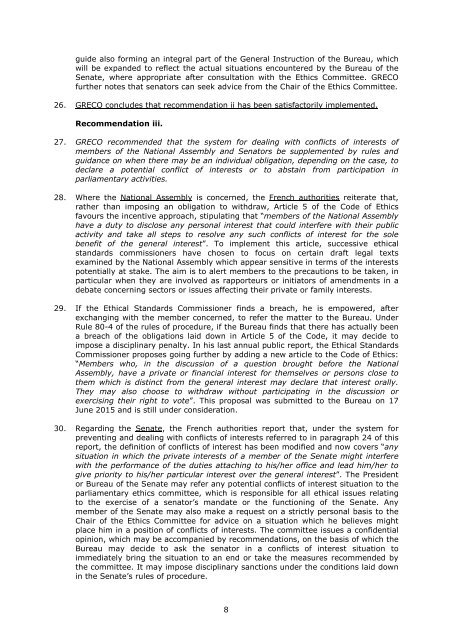F O U R T H E V A L U A T I O N R O U N D
1t62vEg
1t62vEg
Create successful ePaper yourself
Turn your PDF publications into a flip-book with our unique Google optimized e-Paper software.
guide also forming an integral part of the General Instruction of the Bureau, which<br />
will be expanded to reflect the actual situations encountered by the Bureau of the<br />
Senate, where appropriate after consultation with the Ethics Committee. GRECO<br />
further notes that senators can seek advice from the Chair of the Ethics Committee.<br />
26. GRECO concludes that recommendation ii has been satisfactorily implemented.<br />
Recommendation iii.<br />
27. GRECO recommended that the system for dealing with conflicts of interests of<br />
members of the National Assembly and Senators be supplemented by rules and<br />
guidance on when there may be an individual obligation, depending on the case, to<br />
declare a potential conflict of interests or to abstain from participation in<br />
parliamentary activities.<br />
28. Where the National Assembly is concerned, the French authorities reiterate that,<br />
rather than imposing an obligation to withdraw, Article 5 of the Code of Ethics<br />
favours the incentive approach, stipulating that “members of the National Assembly<br />
have a duty to disclose any personal interest that could interfere with their public<br />
activity and take all steps to resolve any such conflicts of interest for the sole<br />
benefit of the general interest”. To implement this article, successive ethical<br />
standards commissioners have chosen to focus on certain draft legal texts<br />
examined by the National Assembly which appear sensitive in terms of the interests<br />
potentially at stake. The aim is to alert members to the precautions to be taken, in<br />
particular when they are involved as rapporteurs or initiators of amendments in a<br />
debate concerning sectors or issues affecting their private or family interests.<br />
29. If the Ethical Standards Commissioner finds a breach, he is empowered, after<br />
exchanging with the member concerned, to refer the matter to the Bureau. Under<br />
Rule 80-4 of the rules of procedure, if the Bureau finds that there has actually been<br />
a breach of the obligations laid down in Article 5 of the Code, it may decide to<br />
impose a disciplinary penalty. In his last annual public report, the Ethical Standards<br />
Commissioner proposes going further by adding a new article to the Code of Ethics:<br />
“Members who, in the discussion of a question brought before the National<br />
Assembly, have a private or financial interest for themselves or persons close to<br />
them which is distinct from the general interest may declare that interest orally.<br />
They may also choose to withdraw without participating in the discussion or<br />
exercising their right to vote”. This proposal was submitted to the Bureau on 17<br />
June 2015 and is still under consideration.<br />
30. Regarding the Senate, the French authorities report that, under the system for<br />
preventing and dealing with conflicts of interests referred to in paragraph 24 of this<br />
report, the definition of conflicts of interest has been modified and now covers “any<br />
situation in which the private interests of a member of the Senate might interfere<br />
with the performance of the duties attaching to his/her office and lead him/her to<br />
give priority to his/her particular interest over the general interest”. The President<br />
or Bureau of the Senate may refer any potential conflicts of interest situation to the<br />
parliamentary ethics committee, which is responsible for all ethical issues relating<br />
to the exercise of a senator’s mandate or the functioning of the Senate. Any<br />
member of the Senate may also make a request on a strictly personal basis to the<br />
Chair of the Ethics Committee for advice on a situation which he believes might<br />
place him in a position of conflicts of interests. The committee issues a confidential<br />
opinion, which may be accompanied by recommendations, on the basis of which the<br />
Bureau may decide to ask the senator in a conflicts of interest situation to<br />
immediately bring the situation to an end or take the measures recommended by<br />
the committee. It may impose disciplinary sanctions under the conditions laid down<br />
in the Senate’s rules of procedure.<br />
8


